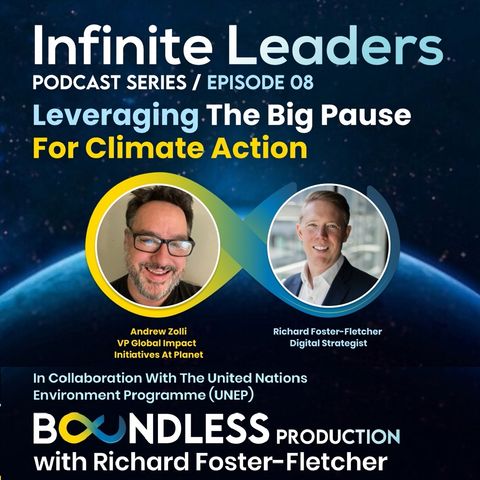EP8 Infinite Leaders: Andrew Zolli, VP Global Impact Initiatives at Planet: Leveraging the big pause for climate action

Regístrate gratis
Escucha este episodio y muchos más. ¡Disfruta de los mejores podcasts en Spreaker!
Descarga y escucha en cualquier lugar
Descarga tus episodios favoritos y disfrútalos, ¡dondequiera que estés! Regístrate o inicia sesión ahora para acceder a la escucha sin conexión.
Descripción
💬 “Rather than thinking that we need to ‘fix’ capitalism, we can think about encouraging a flourishing of diversity and different ways of living on earth. All to move us...
mostra másThis is a conversation with Andrew Zolli
🎙️ Andrew oversees Global Impact initiatives at Planet, a breakthrough space and AI organization that has deployed the largest constellation of Earth-observing satellites in history. These satellites image our whole planet every day in high resolution, and his team makes sure this data is ethically used to its highest and best purposes to monitor the world’s ecosystems, improve humanitarian action and disaster response, protect human rights, transform sustainable development and advance scientific discovery. Planet is exploring how their tools can inform the next iteration of capitalism, where social and environmental externalities are more effectively measured and valued.
🎧 In this episode, Andrew reflects on how 2020 has been a remarkable year for change: he mentioned Black Lives Matter calling it the culmination of social conscience of a whole generation which expressed a broad and deep desire for change. And we saw, albeit in the most painful way possible a glimpse of what a lower carbon future might look like through COVID-19 lockdowns.
Andrews refers to this as a glimpse that a better world might be possible. He spoke about resilience a subject that he’s written extensively about. He provides an in-depth commentary on resilience, referencing it as amongst other things, as the ability to persist, recover, or even thrive amid disruption. And in every system, most societal responses to disruptions are, what adhocratic. We use our knowledge, wisdom, and our rehearsal of disasters and disruptions and combine them with our own imaginative capacity so that we can engage in improvisational kinds of behaviours.
He describes our response to climate change to be more like jazz than classical music. Living systems always orbit a healthy range of different States, a dynamic disequilibrium. And in that disequilibrium is where we find new innovations. We try new experiments, things change, and we adapt and adjust and learn and grow. This experimentation, Andrew says, is also a form of resilience.
Coming back to practical points, Andrew points out that the company Amazon is measured millions of times a day to assess its value. But the Amazon rainforest is not measured nearly as frequently. As we don't value what we don't measure. It's not valued nearly as much. With our current economic systems we only value the trees when they are cut, or land when it’s cleared, we are missing the incredibly important role that the trees are playing while they're standing up, which is that they're enabling humanity to breathe.
So capitalism has produced enormous wealth, but it treats the value of nature as optional. The global capitalist system, Andrew, says cannot continue. We have to align climate and capital. And we must acknowledge that there are many pathways. Rather than fixing capitalism, we want to encourage a flourish of diversity, of civilization, different ways of living on the earth, all in an effort to move us to something that is both sustainable and flourishing in terms of human capacity and civilization.
We have to make the invisible visible for people so that we can reinforce these messages and visualize the interconnected relationships between our planet and our economy. We need to create new norms. Doing away with this idea of dominance over the earth, and encouraging thinking for the long-term.
Andrew works for Planet, helping organizations all over the world to access and act on earth data. There is a huge role for data, analysis and AI since the scale and size and speed of the challenges we're confronting are bigger than our cognition.
We're living through the sixth extinction, but we're also living through the second Renaissance. Through a period when our tools, have never been more powerful. More powerful than many of us are aware of he says. Tools that can combat the weaponization of misinformation and provide evidence when things happen. Planet helps its clients to use the satellite imagery to prove when environmental catastrophes happen, which can be used as evidence at times when governments try to cover up disasters.
Finally, Andrew talks about how the observations have shown how quickly some natural systems recover from intense human impacts. He has seen rewilding initiated on the scale of weeks to months, proof that the earth can and will survive. Andrew is confident that life will flourish on the earth again. This is the moment to think and act in ways that will get humanity into a position where it can flourish along with the rest of the life on the planet.
Información
| Autor | Richard Foster-Fletcher |
| Página web | - |
| Etiquetas |
Copyright 2024 - Spreaker Inc. an iHeartMedia Company
